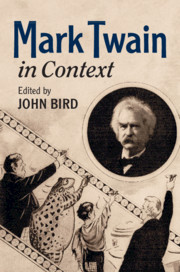Book contents
- Mark Twain in Context
- Mark Twain in Context
- Copyright page
- Contents
- Figures
- Contributors
- Preface
- Acknowledgments
- Chronology
- Abbreviations
- Part I Life
- Part II Literary Contexts
- Part III Historical and Cultural Contexts
- Chapter 15 Politics
- Chapter 16 Business and Economics
- Chapter 17 Religion
- Chapter 18 Science and Technology
- Chapter 19 Race and Ethnicity
- Chapter 20 Race and Ethnicity
- Chapter 21 Race and Ethnicity
- Chapter 22 Cosmopolitanism
- Chapter 23 Gender Issues
- Chapter 24 Gender Issues
- Chapter 25 History
- Chapter 26 Animals and Animal Rights
- Chapter 27 Nationalism and Anti-Imperialism
- Chapter 28 Philosophy
- Part IV Reception and Criticism
- Part V Historical, Creative, and Cultural Legacies
- Further Reading
- Index
- References
Chapter 17 - Religion
from Part III - Historical and Cultural Contexts
Published online by Cambridge University Press: 12 December 2019
- Mark Twain in Context
- Mark Twain in Context
- Copyright page
- Contents
- Figures
- Contributors
- Preface
- Acknowledgments
- Chronology
- Abbreviations
- Part I Life
- Part II Literary Contexts
- Part III Historical and Cultural Contexts
- Chapter 15 Politics
- Chapter 16 Business and Economics
- Chapter 17 Religion
- Chapter 18 Science and Technology
- Chapter 19 Race and Ethnicity
- Chapter 20 Race and Ethnicity
- Chapter 21 Race and Ethnicity
- Chapter 22 Cosmopolitanism
- Chapter 23 Gender Issues
- Chapter 24 Gender Issues
- Chapter 25 History
- Chapter 26 Animals and Animal Rights
- Chapter 27 Nationalism and Anti-Imperialism
- Chapter 28 Philosophy
- Part IV Reception and Criticism
- Part V Historical, Creative, and Cultural Legacies
- Further Reading
- Index
- References
Summary
Religion was a force throughout Twain’s lifetime, early on as the strict Calvinism inherited from his mother, and later as he rebelled against orthodoxy. His reading of Thomas Paine at an early age introduced him to religious skepticism, which challenged the beliefs he held as a child. Despite his skepticism, he was very close with a number of clergymen, most notably his family minister Joseph Twichell, who may be considered his closest adult friend. He vowed to reform and become a devout Christian in order to marry Olivia Langdon, but his “reform” ended after a year or so. In many of his works, he satirically exposes religious hypocrisy, and in his later unpublished writing, most notably Letters from the Earth (not published until 1962), he expresses doubt and scorn for conventional Christianity.
- Type
- Chapter
- Information
- Mark Twain in Context , pp. 171 - 181Publisher: Cambridge University PressPrint publication year: 2020



